- Home
- Bianca Blythe
Don't Tie the Knot (Wedding Trouble Book 1) Page 4
Don't Tie the Knot (Wedding Trouble Book 1) Read online
Page 4
Everyone had said that this was a good time to be a debutante. Men were no longer riding off to war, their epaulets fluttering and their medals gleaming under the sun. Yet the men who returned from the continent and beyond seemed disinclined to marry, favoring the chance to indulge in the pleasures they’d denied themselves in the past. The need to have an heir seemed less urgent when they were no longer dodging cannon balls, and gaming halls seemed more reliable sources of retreat from memories of the war than wedding breakfasts.
But perhaps Georgiana had been wrong, and they’d simply found her distasteful, despite her mother’s insistence that Georgiana attend a finishing school in the hopes of making a good match. The good match never appeared, and now a man who had just been kissing her was grimacing at the prospect of spending additional time with her.
“You should leave,” Georgiana said, and this time the duke’s brother nodded solemnly.
“Think about the money,” he said. “If it is a question of more—”
“It isn’t,” Georgiana said tersely.
Surprise lit his eyes, though unfortunately the emotion did not induce speechlessness. “The duke is betrothed to someone else. He is supposed to marry Lady Isla McIntyre. Her estate borders ours.”
The words ricocheted through her. It wasn’t the first time she’d heard the duke was engaged, but she’d dismissed it as a rumor. After all, if the duke were truly engaged, he wouldn’t have proposed to Charlotte.
But this was the duke’s own brother. This was a man who knew the duke’s supposed other fiancée.
She squared her shoulders. Lord Hamish Montgomery’s words didn’t matter. Perhaps it was even more romantic that the duke had chosen her sister over a more sensible choice. Wasn’t that the sort of thing Loretta Van Lochen would write about in her delightful stories? The duke had given his heart to Charlotte, no matter the consequences.
“It doesn’t matter,” she insisted. “He doesn’t love her. Obviously.”
“I see you are not to be convinced.” The duke’s brother swept into a bow. The gesture seemed ridiculous after he’d barreled through all boundaries by breaking into her chamber via the balcony, but she descended into a curtsy.
What could she do?
In two days her sister would marry the duke, and they would no doubt encounter one another at all manner of family gatherings.
Perhaps her sister would move to Scotland to become duchess of an estate in the Highlands, but Georgiana intended to visit her, despite the unpleasantness of her sister’s new family.
Lord Hamish Montgomery opened the door and slipped outside, and Georgiana was left with the sensation of her heart still beating with a great force like a drummer boy calling troops to a battle that had already been lost.
Chapter Six
Hamish tramped down the tree, grasping the rough bark and branches. Leaves showered over him, perhaps loosened from his recent ascent, and twigs tore at his attire with all the ferocity of Bonaparte’s Grande Armée. The distance from the ground seemed larger and underscored the absurdity of his earlier action. The air was chillier, and a strong breeze rippled over him, as if urging him to catapult to the pavement.
Hamish did not fall.
Not that it mattered.
He’d humiliated himself before the woman determined to become his sister-in-law. What would it matter if he spent the rest of his time in London hobbling on one leg?
Evidently Callum’s fiancée was sufficiently enamored of his brother to not accept Hamish’s generous offer. The lady was mad. Didn’t she know Hamish controlled the finances for the estate? Everything might belong to Callum, but Hamish was the person who occupied himself with it. Did Miss Butterworth imagine Hamish would give her a generous allowance?
Never.
If Miss Butterworth desired to become a duchess, she would have to satisfy herself with being the worst dressed one. He’d hardly want to wager a lifetime on the ability of his brother to interest himself in her. Callum was often on Matchmaking for Wallflowers’ list of rogues to avoid, and Hamish didn’t want to imagine how Miss Butterworth had managed to trap him into marriage.
How terrible that his brawny, charming brother could have been felled by a woman not in possession of a title, and given the shabby state of the townhouse in which she lived, not even in possession of a fortune. Likely she’d confused him with her freckles and feistiness.
Hamish’s feet touched the ground, and he grabbed his hat and hastened from the townhouse. Unfortunately, that did not diminish the newly found habit of Miss Butterworth of occupying his mind. He dashed toward Grosvenor Square. The last thing he needed was for some helpful neighbor or servant to spot him climbing from her chambers and insist he’d compromised her.
Life would be wretched indeed, were he forced to marry her.
The streets widened, the houses became taller, and Hamish soon strode up the steps to his brother’s townhome. He grimaced. How could Callum prefer living here to a castle? There wasn’t even a moat, and he remained unimpressed by the faux columns someone had attached to the façade in place of actual architectural uniqueness. Why be inspired by the pagan temples of people who’d once conquered Britain, when one could have all the best of actual British architecture? Hamish craved his drafting paper and ruling pen.
Never mind.
Lights gleamed from the ground floor. Was his brother unaware that candles could be both lit and blown out? He’d have to gift him some candle douters for Christmas. No wonder Callum’s expenses remained outrageous.
Hamish clasped hold of the brass knocker, shaped like some damned Roman deity adorned with an equally brass and ludicrous laurel wreath.
The door swung open.
Hmph. Clearly Callum had an efficient butler, or perhaps that was an advantage of the lack of sprawling space.
When the door was fully open, no servant greeted him.
It was his brother.
The man appeared the same as always. His height mirrored Hamish’s, and his build consisted of a similar muscularity. He was attired in a black tailcoat and trousers, a white shirt and similarly white cravat. Hamish knew better than to think his brother’s restraint in palate had anything to do with a sober worldview. His cravat knot alone possessed an unnecessary flourish, the work of a valet whose technical prowess with an iron could likely be put to better uses than his brother’s habiliments. Their nursemaids and neighbors had referred to Callum’s flaxen hair as angelic, but now his curls were arranged in a fashionable coiffure, as if he’d just had them trimmed.
No doubt for the wedding.
Beyond Callum, elegant crystal chandeliers dangled from the ceiling, polished black and white tiles that differed from the rough stones of Montgomery Castle gleamed on the floor, and oil paintings of scantily clad gods and goddesses, rather than Scottish ancestors, hung from gilt frames.
“What a wonderful surprise.” Callum spread his lips into a smile Hamish did not for one second believe was derived from happiness.
“It shouldn’t be,” Hamish said. “Since you marry in two days.”
Callum flinched. “Yes. I’m delighted.”
“So delighted you couldn’t tell me about it?”
This time Callum merely smiled, evidently conscious no words could accurately express his emotions and allow him to remain polite.
“Are you going to invite me in?” Hamish asked.
“You seemed to have no trouble inviting yourself this far.”
Some statements required no responses, and Hamish sauntered inside. The place was modern; not a single medieval weapon or stag’s head about. The foyer’s ceilings stretched twenty feet high, an allocation of space that would hardly be beneficial in winter. His brother’s questionable judgment did not limit itself to brides.
“Please, let me show you to your room.” Callum patted him on the back with the suavity of a member of the House of Lords seeking to obtain votes for a project.
“You anticipated my arrival?”
�
��Naturally,” Callum said smoothly, with the same ease with which he’d always successfully lied to their cooks as a child, when they’d questioned him over the oddly low supply of sugar.
“How clairvoyant.” Hamish didn’t bother to mask the sarcasm from his voice.
His brother gave a maddening shrug, as if Callum had any cause to be modest. “Your coach driver presented himself to my servants. And er—my future mother-in-law sent you an invitation.”
“At your request?”
Callum gave a tight smile and busied himself with studying the paintings that dotted the corridor, even though Hamish was certain it must have occurred to him before to look at them.
“Where were you just now?” Callum said, changing the subject.
Hamish hesitated.
Telling his brother that he’d sneaked into the room of his brother’s betrothed to attempt to bribe her so she wouldn’t marry him was the sort of information unlikely to endear him to Callum.
“I just wanted to go on a stroll,” Hamish said, keeping his tone light.
“To admire the capital?” Callum’s lips twitched, and for a moment they may as well have been fifteen, chatting in between cricket innings.
“To wonder at its lack of charm.”
“London is a pleasant city.”
“Our forefathers would roll about in their graves if they heard you say that,” Hamish said.
“Then it would give them some excitement. It must be dull for them to stay constantly still.”
“You are supposed to marry Isla McIntyre,” Hamish said, using his most stern voice.
Callum seemed unfazed. “I suppose I can’t now. Even you wouldn’t condone bigamy.”
“Of course not,” Hamish stammered. Still, his mind drifted to a certain auburn-headed woman. That kiss had been damn good. Contemplating that kiss would be far more pleasant than this conversation. Despite everything, he found his lips veering dangerously high. He might even be smiling.
Callum tilted his head, and his always intelligent eyes narrowed. “You haven’t—”
“Haven’t what?”
“You haven’t met anyone?”
“Nonsense.” Hamish raised his chin and rested his hands on his hips, but his limbs felt unnaturally stiff and a great deal heavier than normal.
“There was just something in your gaze—”
“There wasn’t,” Hamish said curtly. “I’m far too busy.”
“Right.” Callum sighed. “How is your commission?”
“Brilliant.”
“It’s for a baronet?”
“A baron,” Hamish said.
Callum nodded, and his expression turned a seldom seen pensive. “You could use some of the estate money to design your own home.”
“Nonsense. That would be irresponsible.”
“You’ve made it successful. You deserve some of the benefits.”
“The suggestion is absurd.”
Callum sighed. “The money is there.”
“A Montgomery should live at the castle. It’s tradition. God in heaven. It’s called Montgomery Castle.”
“Perhaps it can be renamed Isla’s Solace,” Callum mused.
Hamish narrowed his eyes. His brother seemed...different. Not as jovial, not as rakish, not with that air of nonchalance that Hamish had always found naive. He should be happy that his brother seemed more thoughtful, but instead his demeanor only caused something inside Hamish’s chest to ache. Something is wrong. The man seemed imbued with a seriousness that seemed entirely uncharacteristic, a serious that could perhaps come from a preoccupied mind.
Well, whether Callum was pleased or not, Hamish was here to help him. Perhaps money and freedom did not tempt Callum’s betrothed, but something would. People were remarkably consistent in succumbing to corruption, no matter the loftiness of their status. Miss Butterworth hadn’t seemed like a fool: she should grasp that her position was of the unlofty sort.
A thought occurred to him, and he jerked to a stop. His Hessians squeaked over the marble floor, and Callum swung his gaze toward him.
“Hamish?”
“You haven’t—er—” Hamish wasn’t certain which word to use. The entire thing seemed indelicate.
“What is it?” Callum’s voice wobbled. There was that blasted worry again.
The man had never seemed burdened before. He’d always seemed carefree, like some blasted incarnation of Bacchus, just lacking grapes dangling from his hand.
“You don’t have an heir on the way?” Hamish asked finally.
His brother widened his eyes. “Nonsense. That would be outrageous.”
“It’s not outrageous,” Hamish said, pondering the physical virtues of Callum’s betrothed and his brother’s propensity toward impulsiveness.
“Perhaps not,” Callum said finally. “But in this case, it’s not true. I assure you.”
Hamish narrowed his eyes, as if something in his brother’s expression might possibly explain what had occurred, and he might discover it if he only scrutinized him sufficiently.
Callum turned around and headed for a staircase. “Follow me.”
Hamish did so, noting the wrought iron balusters shaped in the form of scrolls and the glossy banister, which retained the view of the shiny marble foyer. The stairs were of a uniform height, but Hamish had a pang of longing for the stone staircase, the steps worn by age, in Montgomery Castle. What was it that had caused Callum to abandon his life there? And why was he tying his life with someone who would only cause the neighbors anguish?
“You could give some of your work to an estate manager,” Callum said.
“That would be far too economically inefficient,” Hamish said. “Besides, I do an excellent job.”
“Yes,” Callum agreed. “But I just want you to have a good time. Time has a habit of passing. I wouldn’t want you to have regrets.”
“Regrets are only a concern for the illogical who are apt to make poor choices,” Hamish said stiffly. “I’m not the person shackling myself to an inappropriate wife.”
Callum halted his ascension and he turned to Hamish. His expression was stony. “You mustn’t criticize her.”
A lesser man would have been intimidated. Hamish fought the strange urge to step back. Callum’s firmness and devotion were utterly uncharacteristic.
“She’s English,” Hamish said. “How could I not?”
“She wasn’t personally responsible for invading Scotland.”
“Well.” Hamish huffed. “She benefited from it.”
“Our family was hardly decimated. Look at all this.” Callum waved his hand in an expansive gesture.
Hamish scowled. “Then tell me this. If there’s no heir on the way, is she blackmailing you?”
“Blackmail?”
“You know. Does she have some dreadful information on you? Some crime?”
“Like a murder?” Callum said uncertainly, and Hamish’s eyes widened.
“Yes. Like a murder. Though that is an extreme example.”
Callum’s face was bland.
“You haven’t murdered anyone?” Hamish asked, and this time it was his voice that wobbled.
“Me? Of course not.”
“You suggested it,” Hamish grumbled.
“I can speak in hypothetical terms as well,” Callum said. “I had the same tutors, and we attended the same classes.”
Hamish tilted his head. “Is her father blackmailing you?”
Fathers could be devious, especially when it came to their daughters. Even Lord McIntyre had been quick to have Callum be betrothed to Lady Isla, and no man exceeded him in virtue.
“Her father is a vicar. No blackmail.” This time Callum laughed. It was the first time that evening, and Hamish realized he’d missed the sound.
“That’s good,” Hamish said, but he kept his voice somber. “But no matter how vile of an act this marriage is, you should know that you can still leave it.”
“That’s what you came to say?” Callum’s eyes still
sparkled.
“One of the things,” Hamish said, conscious his voice verged on the overly defensive. “I just wanted to let you know that I am here for you.”
“Just don’t assume I am marrying a blackmailer.”
“Because the fact embarrasses you?” Hamish asked, still suspicious.
“Because it’s nonsense. She’s composed and dutiful. Sometimes timid. Poor traits for a blackmailer.”
“Right.” Hamish leaned back and considered his interaction with Callum’s fiancée. She’d hardly seemed unassuming, but it would hardly do for him to bring up Miss Butterworth’s fiery eyes, her wide grin, and heavens, the feel of her body against his.
His mouth felt dry.
Well. Perhaps there were reasons why Callum would want to marry her.
Isla McIntyre might be everything appropriate, but Miss Butterworth was everything inappropriate. There could be pleasure in that as well.
“I just don’t understand it,” Hamish admitted. “I worked so hard to make certain the estate was earning money again. I studied modern agricultural practices, and it worked. The estate is doing well. Why though would you want to lose the house?”
“Wolfe can have the house if he wants,” Callum said. “Compensation for not marrying his sister.”
“But it could be yours,” Hamish said. “That was the plan.”
“Plans change,” Callum said. “And I’m not marrying her.”
“But there’s nothing wrong with Lady Isla,” Hamish protested.
“I’m not saying there is,” Callum said. “Look. I’m very grateful for your work on the estate. The land is still ours. Just not its—”
“Crown?”
Callum flinched. “It’s just a castle. Perhaps some things are more important.”
“It’s not just a castle,” Hamish protested. “It’s our family’s history. I could have been studying architecture.”
“I’m sorry you couldn’t,” Callum said.
Hamish averted his eyes.
“Still, you are doing well for yourself,” Callum continued.

 The Earl's Christmas Consultant
The Earl's Christmas Consultant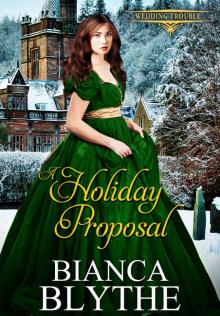 A Holiday Proposal (Wedding Trouble Book 6)
A Holiday Proposal (Wedding Trouble Book 6) The Earl's Christmas Consultant (Wedding Trouble Book 3)
The Earl's Christmas Consultant (Wedding Trouble Book 3) A Kiss for the Marquess (Wedding Trouble Book 5)
A Kiss for the Marquess (Wedding Trouble Book 5)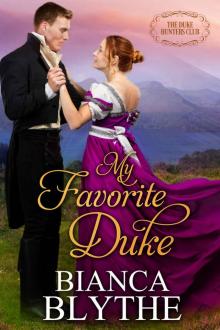 My Favorite Duke (The Duke Hunters Club Book 2)
My Favorite Duke (The Duke Hunters Club Book 2)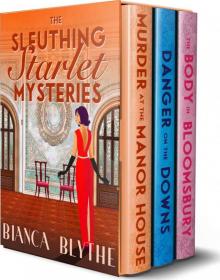 The Sleuthing Starlet Mysteries
The Sleuthing Starlet Mysteries Lords, Snow and Mistletoe
Lords, Snow and Mistletoe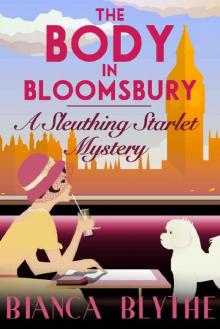 The Body in Bloomsbury
The Body in Bloomsbury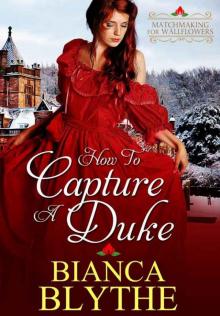 How to Capture a Duke (Matchmaking for Wallflowers Book 1)
How to Capture a Duke (Matchmaking for Wallflowers Book 1)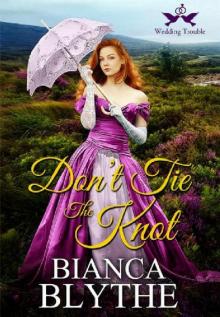 Don't Tie the Knot
Don't Tie the Knot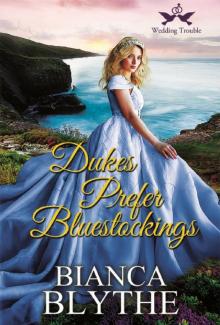 Dukes Prefer Bluestockings
Dukes Prefer Bluestockings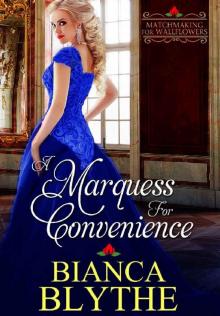 A Marquess for Convenience (Matchmaking for Wallflowers Book 5)
A Marquess for Convenience (Matchmaking for Wallflowers Book 5) Lords, Snow and Mistletoe: A Regency Christmas Collection
Lords, Snow and Mistletoe: A Regency Christmas Collection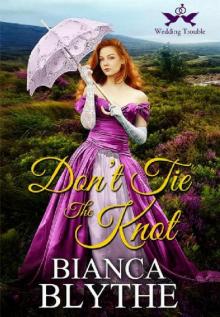 Don't Tie the Knot (Wedding Trouble Book 1)
Don't Tie the Knot (Wedding Trouble Book 1)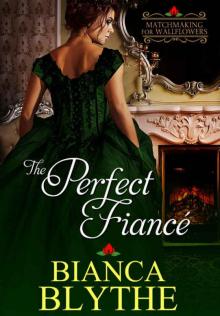 The Perfect Fiancé (Matchmaking for Wallflowers Book 0)
The Perfect Fiancé (Matchmaking for Wallflowers Book 0)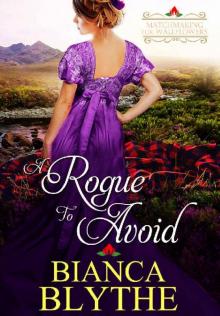 A Rogue to Avoid (Matchmaking for Wallflowers Book 2)
A Rogue to Avoid (Matchmaking for Wallflowers Book 2)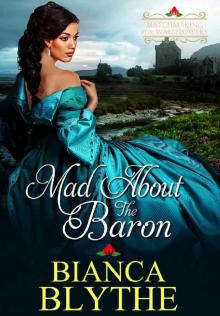 Mad About The Baron (Matchmaking for Wallflowers Book 4)
Mad About The Baron (Matchmaking for Wallflowers Book 4)